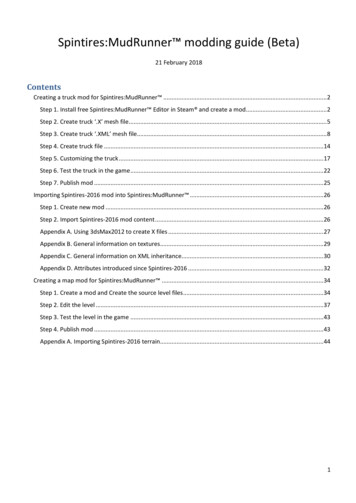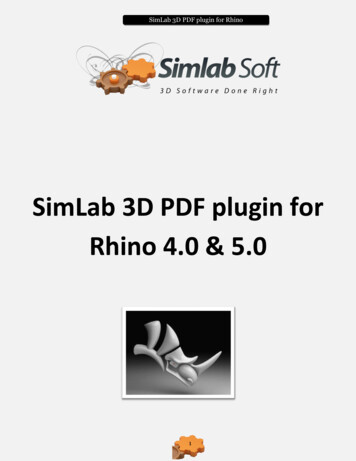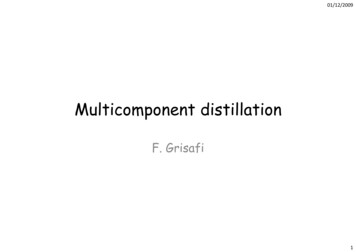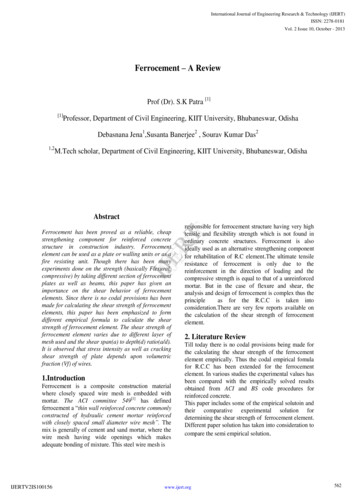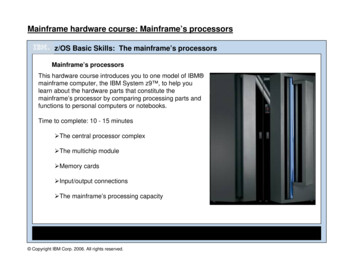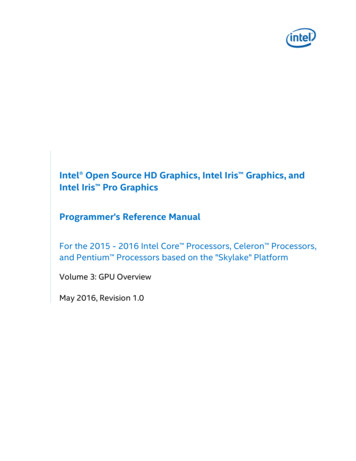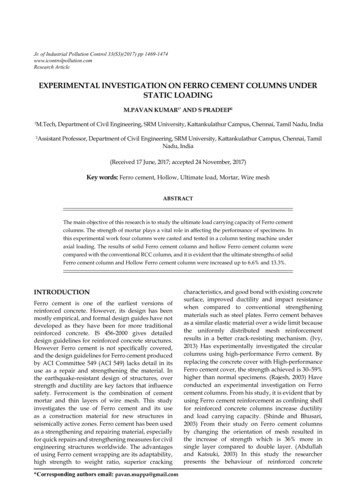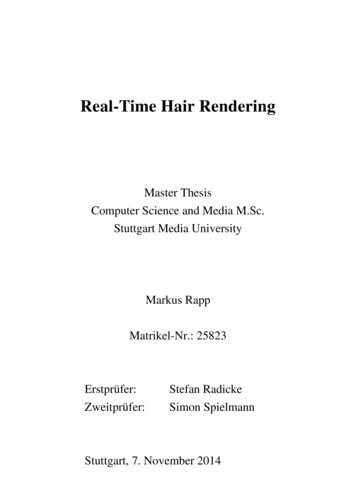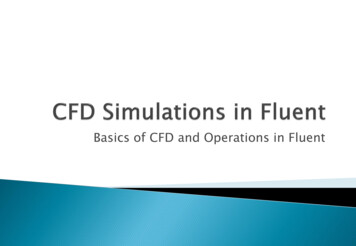
Transcription
Krabl Mesh Processors v1.0.283 ManualMesh Processing Framework for Unity3Dc 2013 by krabl.comhttp://krabl.comManual written with LATEX on December 7, 2013
1Introduction“Krabl Mesh Processors” is an add-on for the Unity3D game engine to perform mesh processing. It consists of a C# mesh processing library and an editor extension which provides a mesh input processingworkflow inside the Unity3D editor.Different kinds of mesh processors can be chained together right inside the Unity3D mesh inspector.These import programs are executed every time Unity imports a mesh (inside a model).Processors include mesh simplification (polygon reduction) and mesh subdivision. The system is designed to be extended with more processors and workflows in the future.Main features: C# mesh processing library with Unity3D editor integration. Supports Unity3D Free and Pro on all platforms. Requires Unity v4.0 or newer. High quality mesh simplification (polygon reduction). Quad-based mesh subdivision. Mesh attributes filtering, crease detection. Extends the Unity3D mesh inspector to work like the texture inspector. Adds UV displays to the mesh inspector. Automated mesh import programs with build target dependent settings. Comes with full source code (C#) and a utility class to easily process meshes in your own scripts(in any language supported by Unity3D) during runtime.2
Contents1 Introduction22 End User License Agreement43 Package Contents/Directory Structure54 Tutorial4.1 Import simplification of a static high-poly mesh (skull). . . . . . . . . . . . . . . . . . . . .4.2 Import simplification of a skinned mesh (animated bonerod). . . . . . . . . . . . . . . . .4.3 Import subdivision with crease detection and platform-dependent simplification of a staticlow-poly mesh. . . . . . . . . . . . . . . . . . . . . . . . . . . . . . . . . . . . . . . . . . .66785 Mesh Inspector5.1 Mesh Information/Adding programs5.2 Menu/Keyboard Shortcut . . . . .5.3 UV displays . . . . . . . . . . . . .5.4 Program settings . . . . . . . . . .991010116 Import Processors6.1 Simplify . . . . . .6.2 Subdivide (Quads)6.3 Detect Creases . .6.4 Filter Attributes . .1212131314.7 Krabl Mesh Library Scripting153
2End User License AgreementEND-USER LICENSE AGREEMENT FOR krabl.comThis krabl.com End-User License Agreement (“EULA”) is a legal agreement between you (either an individual ora single entity) and krabl.com for the software accompanying this EULA, which includes computer software andelectronic documentation (“SOFTWARE PRODUCT” or “SOFTWARE”). By exercising your rights to make and usecopies of the SOFTWARE PRODUCT, you agree to be bound by the terms of this EULA. If you do not agree to theterms of this EULA, you may not use the SOFTWARE PRODUCT.DISCLAIMER OF WARRANTYThis product is provided on an “AS IS” basis, without warranty of any kind, expressed or implied, including anywarranties of fitness for a particular purpose. The authors shall not be liable for damages of any kind. Use of thissoftware indicates you agree to this.SOFTWARE PRODUCT LICENCEThe SOFTWARE PRODUCT is protected by copyright laws and international copyright treaties, as well as otherintellectual property laws and treaties. The SOFTWARE PRODUCT is licensed, not sold.GRANT OF LICENSEInstallation and Use:You may install and use copies of the SOFTWARE PRODUCT on all computers you own.Reproduction and Distribution:You may not reproduce or distribute the SOFTWARE PRODUCT except to make backup copies.DESCRIPTION OF OTHER RIGHTS AND LIMITATIONSTermination:Without prejudice to any other rights, krabl.com may terminate this EULA if you fail to comply with the terms andconditions of this EULA. In such event, you must destroy all copies of the SOFTWARE PRODUCT and all of itscomponent parts.COPYRIGHTAll title and copyrights in and to the SOFTWARE PRODUCT (including any images, and text incorporated into theSOFTWARE PRODUCT) and any copies of the SOFTWARE PRODUCT are owned by krabl.com or its suppliers.4
3Package Contents/Directory StructureAssetsMeshProcessorsDemo . Content to demonstrate the capabilities of thepackage. This folder can safely be deleted if itscontents are not needed.KrablMeshDemo.scene.The tutorial demo scene.MaterialsModelsScriptsKMDemoBoneRot.cs.The animation script used in the skinned mesh(Bonerod) example.TexturesDocumentationKrabl Mesh Processors Manual.pdf . The user manual you are reading.Krabl Mesh Lib Reference HTML.zip . Doxygen generated zipped html reference for themost useful calls and classes of the krabl meshlibrary. Unzip and open the enclosed index.htmlto browse it.ImportPostprocess . The C# classes used for the editor integrationand the post processing workflow.MeshImportProcessorSettings.asset. . This file is not included but generated once amesh import processor program is added to anymesh. It contains all the import programs. Thisshould never be changed or duplicated by theuser. If it is erased, all import programs aredeleted.Processors. . The source code of the processors than can beused in import programs.PluginsKrablMeshLibrary.The mesh processing library files. If you justwant to use the library in your scripts, this folderis all you need. It is placed inside the globalUnity3D Plugins folder to allow accessing the library from UnityScript and Boo scripts.Librarykrablmeshrevisions . This file is not included but generated once import processor programs are executed. It contains revision numbers for each model that areneeded to keep the meshes current if a project ismodified on different machines.5
4TutorialThis tutorial shows how to simplify a static mesh, how to simplify a skinned mesh and how to applysubdivision and a number of changes to a low poly mesh during mesh import. To begin, open the demoscene by double-clicking KrablMeshDemo.scene inside MeshProcessors/Demo.4.1Import simplification of a static high-poly mesh (skull).1. Navigate to the “Skull” model in the project folder (inside MeshProcessors/Demo/Models) and drilldown to the “Skull” mesh and select it.2. In the mesh inspector, click on “Add Mesh Import Program” to create a mesh import program forthe skull mesh.3. Click on “Add Processor here.” and choose “Simplify” to create a simplification mesh processor.4. Enter 3000 in the “Target Triangle Count” field and click “Apply” at the bottom of the program toreimport the mesh and calculate the program. You have now reduced the polygon count of theskull mesh to 3000 triangles.6
4.2Import simplification of a skinned mesh (animated bonerod).1. Hit the main play button to start gameplay in Unity3D. There is a rotation script on the center rodand the rod will start deforming. The rod has many redundant faces from subdivision, especiallyat its top and bottom.2. Navigate to the “Bonerod” model in the project folder and select the bonerod mesh inside it. Thereare multiple items inside the model because this is a skinned mesh. Make sure to select just themesh.3. Create a program using “Add Mesh Import Program” and add a “Simplify” processor to it.4. Enter 284 as the target triangle count and hit “Apply” at the bottom of the program.5. With 284 triangles, the rod looks still exactly the same. The simplification has determined whatfaces are deformed and protected them during the process.6. Click on the triangle to the left of “Simplification Weights (Advanced)” to expand the weightingsection of the simplification processor. The “Bone Weights” setting has been set to 1.0 by defaultand this is what made simplification consider the bone weights of the mesh.7
4.3Import subdivision with crease detection and platform-dependent simplification of a static low-poly mesh.1. Locate the “Trompi” mesh inside the “Plant” model in the project folder. The framework contains ashortcut. Select the plant object in the scene view and hit Shift-Ctrl-M (Win) / Shift-Command-M(Mac). This will open the mesh inspector for the selected objects first mesh.2. Create the mesh import program as in the previous tutorials.3. Add a “Subdivide (Quads)” processor and click “Apply”. The mesh will be subdivided once.4. Add a “Detect Creases” processor, then click on “Up” to move it above the subdivision processorso it is executed before the subdivision.5. In “Detect Creases” Enable the “Edge Angles” option and set the “Min Edge Angle” to 90, thenclick “Apply” again. The mesh will now have a sharp rim on top.6. Go back to the subdivision processor and increase the iterations to 3, then click “Apply” again. Themesh is now very smooth in the scene view and consists of 9536 triangles.7. Click the iPhone (iOS) icon above the iterations field. Click on “Override for iPhone” and set theiterations to 2 and click “Apply”. If you now switch Unity3D to build for iPhone (under “File/BuildSettings.”), the model will be reimported automatically and will only be subdivided with 2 iterationswhile keeping the 3 subdivisions for all other build target platforms.8
55.1Mesh InspectorMesh Information/Adding programsKrabl Mesh Processors extends the Unity3D built-in mesh inspector.Mesh Path This is the path to the model file that contains the mesh relative to the project assets folder.At the end of the line, the mesh name is displayed after a “-”.Description The description of the mesh in its original state before any processing is applied by themesh processors. This allows you to compare the basic mesh parameters before and after processing.Add Mesh Import Program’ This button creates a mesh import program if the mesh does not have oneyet. This will also create the MeshImportProcessorSettings file if it does not exist.9
5.2Menu/Keyboard ShortcutKrabl Mesh Processors includes an editor script (KMLocateMesh.cs) which adds shortcuts to get to themesh asset inspector belonging to a selected object. It adds a menu entry to the “GameObject” menucalled ‘nspect Mesh Importer for selected Mesh”. The same function can be triggered with a keyboardshortcut: shift-ctrl-M on Windows and shift-command-M on Mac OS X.To quickly get to the import settings for a mesh visible in the scene, select the GameObject with thatmesh and hit the keyboard shortcut . The correct mesh inspector will show up in Unity’s Inspector pane.This works best if only one mesh is inside the selection.5.3UV displaysThe mesh inspector extension includes the option to view the UV coordinates of your meshes if theyhave any. On the right side of the Mesh Preview title you get the option to switch between the regular(Solid) view as well as UV and UV2 displays. If a mesh has UV coordinates outside the 0-1 range, thedisplays zoom out, otherwise they always show the 0-1 range.10
5.4Program settingsOnce a program has been created for a mesh, the basic program settings are displayed.Delete Delete the mesh import program for this mesh. This is not undoable and thus you will beprompted to confirm in case any processors (with settings) have been created.Input Tolerance The maximum difference considered equal for vertices and normals when they arefed into the processor chain. Usually 0 should work fine, but apparently some modeling softwareproduces only nearly equal vertices/normals. If weird topology is produced, try setting the value tosomething like 1e-6.Optimize Mesh Let Unity3D improve the mesh element order after processing to render faster on theGPU. It is quick and highly recommended.Bypass Program Do not do any processing and just output the input mesh. This is useful to comparethe original mesh with the processed mesh.Revert Revert the current changes to this mesh import program. This include processor settings andorder as well as global mesh settings, but not creation/deletion of the program.Apply Apply the current changes to this mesh import program. This will save the changes to disc andtrigger a reimport of the model which contains the mesh.11
6Import ProcessorsThe processors described here can be used in any order in any mesh import program. They are createdby first creating a mesh import program in the mesh inspector and then clicking of “Add processor here.”and choosing the processor to create.6.1SimplifyThe “Simplify” processor performs mesh simplification based on edge collapses. It can simplify a meshto a target number of triangles. The processing of mesh attributes can be configured. The target trianglecount can be overridden per build target platform.Simplify (Up Down) (DEL) Click the processor title or the checkbox on its left side to enable/disablethe processor in the chain. Use Up and Down to move this processor in the chain and change theprocessing order (always top to bottom). Click DEL to remove this processor.Allow Vertex Repositioning Calculating new vertex positions leads to a more accurate mesh shapebut can have a negative impact on mesh attributes (UVs, skin, colors, .) because interpolation isneeded. Disabling Repositioning will speed up calculations.Protect Details Enable to prevent small independent mesh features to be totally removed. Technicallythis will prevent the creation of non-manifold edges during the simplification. Protecting details isnot recommended for low target polygon counts.Simplification Weights(Advanced) Extend the weights section by clicking on the small triangle to theleft. This is a group of parameters that affect how the mesh is simplified. They determine whichedges get collapsed first and allow to preserve special features of a mesh.Mesh Borders The amount of protection for edges at mesh borders (edges only connected to oneface at the borders of a mesh).Creases The Amount of protection for edges that have been marked as creases. At the beginningof processing all edges with normal breaks are automatically marked as creases. Differentedges can be marked as creases with the “Detect Creases” processor.UV Seams The amount of protection for UV seam edges. These are edges which are part ofmultiple separate UV islands. If this value is set very high, the shape of UV islands will notchange at all.UV2 Seams The amount of protection for UV2 seam edges. These are edges which are part ofmultiple separate UV2 islands. If this value is set very high, the shape of UV2 islands will notchange at all.12
Material Seams The amount of protection for edges connecting faces with different materials.Bone Weights The amount of protection for edges which have different bone weights at their twovertices. The higher this value, the less flexible areas of skinned meshes get simplified.Vertex Colors The amount of protection for edges which have different vertex colors at their twovertices. The higher this value, the less areas with vertex color changes get simplified.Target Triangle Count The number of triangles the result mesh should have. Simplification stops oncethe mesh has this amount or less triangles. As an edge collapse usually removes two triangles,the result mesh might have a few triangles less than this value.Above the target triangle count field is a build target platform selection bar where you can overridethis settings to different values for each build target platform Unity3D supports.6.2Subdivide (Quads)The “Subdivide (Quads)” processor applies iterations of quads-based subdivision to the mesh. Optionally it can merge triangles to quads before the subdivision. The number of iterations can be overriddenper platform.Tris to Quads If this settings is enabled, the processor will merge triangles to quads before the subdivision. Quads generally lead to better subdivision results. Quads are produced by merging twoneighbouring triangles by dissolving their connecting edge.Max Edge Angle If “Tris to Quads” is enabled, this defines the maximum angle between two triangles that can be merged to a quad.Normal Mode How to calculate the vertex normals after subdivision.Interpolate Linearly interpolate normals of the input mesh during the subdivision. If there is something special about the input normals, this option will most likely preserve it.Recalculate Calculate new normals based on the mesh shape once the subdivision is complete.This is the recommended option as it leads to the normals conforming to the mesh shape.Iterations How many times to execute the subdivision algorithm. For every execution, each face is splitinto four triangles. High iteration counts lead to meshes with more vertices/faces than Unity3D canhandle (The limit is 65k).6.3Detect CreasesThe “Crease Detect” processor marks edges as creases on adjustable conditions. It will recalculatethe vertex normals of the mesh if necessary. It is especially powerful when placed above s subdivisionprocessor as the crease information greatly affects subdivision.13
Mesh Normals Compare the vertex normals of the faces connected to each edge. If they are not thesame, mark the edge as crease. This is already automatically done at the beginning of mesh processing. It preserves what it known as “smoothing group“ or “edge split”. The normal comparisonis sensitive to the programs “Input Tolerance” setting.Edge Angles Calculate the angle between the faces connected to each edge and mark every edgewith an angle above the threshold as crease.Min Edge Angle If “Edge Angles” is enabled this determines the minimum edge angle to mark asa crease.Material Seams Every edge connected to faces of different materials/submeshes is marked as a crease.6.4Filter AttributesThe “Filter Attributes” processor allows to remove certain mesh attributes.Materials/Submeshes If set to “Merge”, all faces of the mesh will be set to the same material/submesh.Vertex Colors If set to “Remove”, vertex colors are removed from the mesh.UV If set to “Remove”, UV coordinates are removed from the mesh. Most shaders need UV coordinates.UV2 If set to “Remove”, UV2 coordinates are removed from the mesh. UV2 coordinates are usuallyused for lightmaps in Unity.14
7Krabl Mesh Library ScriptingThe following example scripts show how to process meshes with the KrablMeshUtility class inside C#,UnityScript and Boo scripts. More more in-depth scripting information, please read the included KrablMesh Library html documentation.The C# example simplifies the mesh of a MeshFilter on the same GameObject to a fraction of its trianglecount when the game is started:12345678910111213141516using public class KMDemoSimplify: MonoBehaviour {[Range(0.0f, 1.0f)]public float factor 0.5f;void Start () {MeshFilter mf GetComponent MeshFilter ();Mesh mesh mf.mesh;int numTriangles esh(mesh, ((int)(factor ((float)numTriangles))));mf.mesh mesh;}}Listing 1: KMDemoSimplify.cs (C#)The UnityScript example subdivides an attached MeshFilter/Mesh on game start:12345678910111213#pragma strict@script RequireComponent(MeshFilter)@Range(1, 4)var iterations : int 1;function Start () {var mf : MeshFilter GetComponent(MeshFilter);var mesh : Mesh mf.mesh;KrablMeshUtility.SubdivideQuadsMesh(mesh, iterations, true);mf.mesh mesh;}Listing 2: KMDemoSubdivide.js (UnityScript)The Boo example converts the mesh normals to produce a flat shaded look on game start:12345678910import lass KMDemoFlatShade (MonoBehaviour):def Start ():mf as MeshFilter GetComponent[of MeshFilter]()mesh as Mesh mf.meshKrablMeshUtility.FlatShadeMesh(mesh)mf.mesh meshListing 3: KMDemoFlatShade.boo (Boo)15
For a glimpse at how the library works in more detail, here is the part of KrablMeshUtility which providesthe simplification method. In essence, the library always needs to convert a mesh coming from Unity toits own data-structure, then do the processing and then convert back.12345678910111213141516171819public static void SimplifyMesh(Mesh unityMesh, int targetFaceCount, bool highQuality true) {KrablMesh.MeshEdges kmesh new KrablMesh.MeshEdges();KrablMesh.Simplify sim new KrablMesh.Simplify();KrablMesh.SimplifyParameters simpars new ort.UnityMeshToMeshEdges(unityMesh, kmesh);simpars.targetFaceCount targetFaceCount;simpars.recalculateVertexPositions highQuality;simpars.checkTopology !highQuality;simpars.maxEdgesPerVertex highQuality ? 18 : 0;if (highQuality false) {simpars.preventNonManifoldEdges false;simpars.boneWeightProtection 0.0f;simpars.vertexColorProtection 0.0f;}sim.Execute(ref kmesh, sh(kmesh, unityMesh);}Listing 4: SimplifyMesh method of KrablMeshUtility.cs (C#)If you need more information about library scripting, please check out the included “Krabl Mesh Lib Reference HTML.zip” or browse the C# source code. The latest library reference can also be found cs.16
sists of a C# mesh processing library and an editor extension which provides a mesh input processing workflow inside the Unity3D editor. Different kinds of mesh processors can be chained together right inside the Unity3D mesh inspector. These import programs are executed every tim
